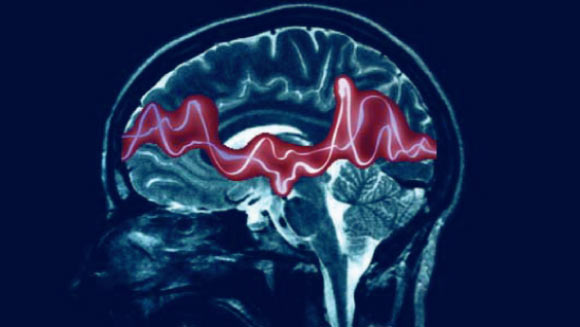Deficiencies in hyaluronan, a substance that occurs naturally inside the body and attracts water molecules, can lead to spontaneous epileptic seizures, according to a new study published in the April issue of the Journal of Neuroscience.

Epilepsy is a brain disorder causing seizures that disturb brain activity. Image credit: Epilepsy Foundation.
Hyaluronan, also called hyaluronic acid or hyaluronate, is a polysaccharide molecule widely distributed throughout connective, epithelial, and neural tissues, including the brain’s extracellular space (ECS).
“Hyaluronan is widely known as a key structural component of cartilage and important for maintaining healthy cartilage. Curiously, it has been recognized that the adult brain also contains a lot of hyaluronan, but little is known about what hyaluronan does in the brain,” said study senior author Prof Yu Yamaguchi of Sanford-Burnham Medical Research Institute.
“This is the first study that demonstrates the important role of this unique molecule for normal functioning of the brain, and that its deficiency may be a cause of epileptic disorders. A better understanding of how hyaluronan regulates brain function could lead to new treatment approaches for epilepsy.”
The extracellular matrix of the brain has a unique molecular composition. Earlier studies focused on the role of matrix molecules in cell adhesion and axon pathfinding during neural development.
In recent years, increasing attention has been focused on the roles of these molecules in the regulation of physiological functions in the adult brain.
In the new study, Prof Yamaguchi and his colleagues examined the role of hyaluronan using mutant mice deficient in each of the three hyaluronan synthase genes – Has1, Has2, Has3.
“We showed that Has-mutant mice develop spontaneous epileptic seizures, indicating that hyaluronan is functionally involved in the regulation of neuronal excitability,” said co-author Dr Sabina Hrabetova of SUNY Downstate Medical Center.
“Our study revealed that deficiency of hyaluronan results in a reduction in the volume of the brain’s ECS, leading to spontaneous epileptiform activity in hippocampal CA1 pyramidal neurons.”
Dr Katherine Perkins of SUNY Downstate Medical Center added: “we believe that this study not only addresses one of the longstanding questions concerning the in-vivo role of matrix molecules in the brain, but also has broad appeal to epilepsy research in general.”
“More specifically, it should stimulate researchers in the epilepsy field because our study reveals a novel, non-synaptic mechanism of epileptogenesis. The fact that our research can lead to new anti-epileptic therapies based on the preservation of hyaluronan adds further significance for the broader biomedical community and the public.”
______
Amaia M. Arranz et al. 2014. Hyaluronan Deficiency Due to Has3 Knock-Out Causes Altered Neuronal Activity and Seizures via Reduction in Brain Extracellular Space. The Journal of Neuroscience, 34(18): 6164-6176; doi: 10.1523/JNEUROSCI.3458-13.2014







